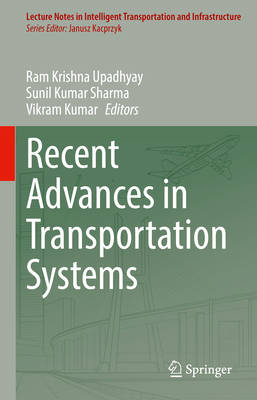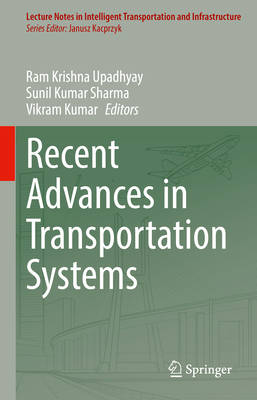
- Afhalen na 1 uur in een winkel met voorraad
- Gratis thuislevering in België vanaf € 30
- Ruim aanbod met 7 miljoen producten
- Afhalen na 1 uur in een winkel met voorraad
- Gratis thuislevering in België vanaf € 30
- Ruim aanbod met 7 miljoen producten
Zoeken
Recent Advances in Transportation Systems
€ 242,95
+ 485 punten
Omschrijving
This book aims to provide a comprehensive overview of recent advancements in the field of transportation, focusing on key areas of innovation and sustainability. It will delve into a wide range of topics, from cutting-edge technologies to policy implications, offering valuable insights for researchers, policymakers, and industry professionals. By addressing key challenges and opportunities, the book aims to contribute to the development of more sustainable, efficient, and equitable transportation systems. The book employs a combination of research methods, including literature reviews, case studies, and expert interviews, to provide a comprehensive overview of the transportation landscape. This book defines the current status of the transportation, pavements, modern port facilities, decarbonization, modern port facility, and multi-modal approach for transportation safety. Indian ports have made significant strides in modernizing their infrastructure, but challenges persist in areas such as berth capacity, equipment efficiency, and hinterland connectivity. To accurately evaluate port performance, a comprehensive set of metrics is needed, including cargo throughput, vessel turnaround time, and operational costs. Embracing automation, digitalization, and data analytics can significantly improve efficiency and reduce operational costs. Technologies like automated guided vehicles (AGVs), remote-controlled cranes, and blockchain can streamline processes and enhance transparency. Improving road, rail, and inland waterway connectivity between ports and their hinterlands is crucial for efficient cargo flow and reducing congestion. Incorporating sustainable practices, such as reducing emissions and minimizing environmental impact, is becoming increasingly important for ports. Advances in materials science and construction techniques have significantly improved the durability and longevity of concrete pavements, making them a viable and sustainable option for transportation infrastructure. Concrete pavements are increasingly being designed and constructed with sustainability in mind, incorporating recycled materials, reducing environmental impact, and improving energy efficiency.
Specificaties
Betrokkenen
- Uitgeverij:
Inhoud
- Aantal bladzijden:
- 841
- Taal:
- Engels
- Reeks:
Eigenschappen
- Productcode (EAN):
- 9783032016614
- Verschijningsdatum:
- 20/03/2026
- Uitvoering:
- Hardcover
- Formaat:
- Genaaid
- Afmetingen:
- 155 mm x 235 mm

Alleen bij Standaard Boekhandel
+ 485 punten op je klantenkaart van Standaard Boekhandel
Beoordelingen
We publiceren alleen reviews die voldoen aan de voorwaarden voor reviews. Bekijk onze voorwaarden voor reviews.







